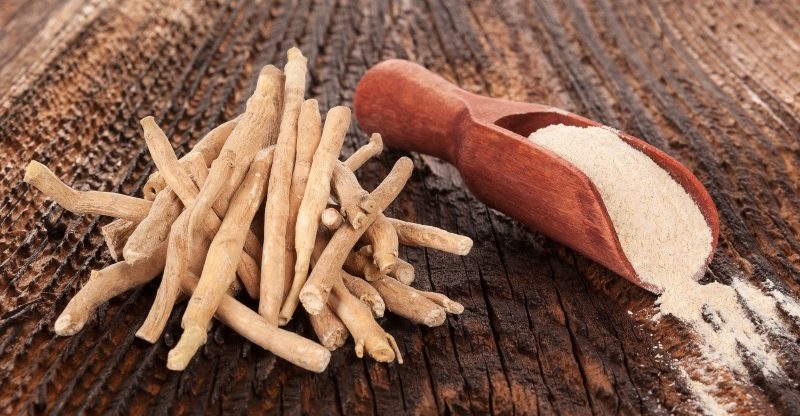21 Evidence-Based Benefits of Ashwagandha Root
Ashwagandha is becoming increasingly familiar to those interested in herbal and alternative treatments for improving their health.
This natural herb has been a part of ancient medical traditions for centuries.
Scientists and physicians are constantly learning more about the ways it can improve health and treat diseases and disorders.
In addition to supplying excellent protection against stress and its impact on the body, Ashwagandha is also able to manage both chronic and acute conditions without the adverse side effects of most prescription medications.
If you are wondering if this amazing herbal treatment can help you feel better, live longer and be healthier, keep reading to learn more.
What is Ashwagandha?
Ashwagandha (Withania somnifera) is a plant in the nightshade family.
This medicinal herb is commonly used in Ayurvedic medicine.
It has many names, including poison gooseberry, Indian ginseng, and winter cherry.
Ashwagandha grows as a short shrub that is native to the drier regions of India, China, Nepal, and Yemen.
Ashwagandha is categorized as an adaptogen because it helps the human body to cope with and neutralize the effects of chronic stress on its systems and processes.
While it has been used for thousands of years in many healing traditions, it has only been clinically studied very recently.
This herb derives its powers from its primary phytochemicals, including several types of withanolides, alkaloids, and sitoindosides (1).
This herb also has phenols, terpenoids, flavonoids, and tannins.
In Ayurveda, this herb has long been used to promote vitality and longevity.
It has traditionally been administered as a tonic to support overall well-being.
A warm beverage of dried herb powder, honey, milk, and ghee is commonly given to the elderly, young children, and the sick for relaxation before bedtime.
It is purported to improve hormone balance, memory, and energy.
It has also been used to enhance joint health.
Ashwagandha stimulates the immune system, decreases inflammation and is gentle enough for nearly everyone to use it daily with no adverse effects.
You may need to take a higher dose of this herb to feel the results.
It is, therefore, recommended that you buy a powder that has at least 2.5 percent Withanolides, which are the active compounds found in this plant.
Traditionally, all parts of the Ashwagandha plant have been used for various purposes.
The roots have most commonly been used as a stimulant or tonic, due to its pain-relieving and antiparasitic properties.
The plant’s leaves have been used to treat swelling and fever, while the flowers were commonly used for their ability to purify and detoxify.
Even the berries, stems, and bark were used for treating skin ulcers, tumors, and other skin problems.
Ashwagandha is now available as an essential oil or extract and in capsules, powder, pills, and tea.
Most people take between three and six grams per day of the dried Ashwagandha root and between 300 and 500 milligrams per day of the liquid.
Even at extremely high doses, Ashwagandha is considered to be safe.
Health Benefits of Ashwagandha
Reduces Stress
The main reason to use an adaptogen, like Ashwagandha, is to help your body cope better with stress (2).
This herb and other adaptogens work by interacting with the hypothalamic-pituitary-adrenal (HPA) axis and the sympathoadrenal system of your body, which are both responsible for how your body responds to stress.
Ashwagandha can alter your hormone production and change the physiological responses of your body to these stressors to ensure your immune system and other functions are performing well in stressful situations.
Clinical studies have shown that taking Ashwagandha improves your perceptions of stress, lowers cortisol levels and helps you feel happier (3).
In one study, those taking this herb also reported lower levels of anxiety (4).
Over time, taking Ashwagandha regularly can reduce other symptoms associated with stress, like depression as well as improve your overall tolerance for stress (5, 6).
Enhances Memory
Ashwagandha has also traditionally been used to help improve memory, particularly in the very young and very old (7).
For those with mild cognitive impairment, Ashwagandha has been proven to improve immediate memory, as well as general memory function (8).
Other studies also show that it can increase the working memory for language and verbal learning (9).
Because this herb is able to relax the body and mind, these effects may also contribute to enhancing long-term visual memory (10).
Improves Immune System
Ashwagandha has the ability to help fight infections from many different pathogens, including bacteria, viruses, fungi, and parasites.
Overall, taking the root extract of the Ashwagandha plant can also increase your immune system’s cell activation (11).
As an anti-bacterial, this herb, when combined with conventional medications to treat tuberculosis, improved the healing time and decreased the symptoms for patients (12).
It has also been shown to be effective at treating salmonella (13) and Methicillin-resistant Staphylococcus aureus or MRSA (14).
In addition to helping to fight viruses, Ashwagandha can also help kill viruses.
It has been shown in various studies to help kill viral hepatitis (15), chikungunya (16), herpes simplex type 1 (17), HIV-1 (18), and the virus that causes Infectious Bursal Disease (19).
Ashwagandha is effective at fighting certain kinds of fungal infections (20), as well as helping the immune system to fight against malaria (21) and leishmaniasis (22).
Alleviates Pain
For many people, Ashwagandha can be used to effectively relieve pain.
It has been shown to work effectively on joint pain and swelling, as well as osteoarthritis pain (23, 24).
This herb has been used for centuries to treat mild pain of all types.
It is safe for nearly everyone to use to treat everyday aches and pains.
Treats Male Fertility Issues
Because stress affects hormone levels, including testosterone, it can have a negative impact on male fertility.
Taking just five grams of Ashwagandha per day has been shown to increase the hormones necessary to improve sperm motility and count, thus enhancing fertility probability (25).
Similar studies showed that just 675 milligrams also had a positive effect (26).
Unfortunately, Ashwagandha cannot treat all types of erectile dysfunction (27).
It was also shown to impair sex drive and sexual performance in at least one animal trial (28).
Therefore, further research is needed to determine its most appropriate dosage and use for treating male fertility and libido problems.
Enhances Female Hormone Regulation
For some women, Ashwagandha has been shown to have a positive effect on hormone management to help with certain medical problems.
For example, menopausal women can use Ashwagandha to help regulate hormone secretion, resulting in the reduction of many of the uncomfortable symptoms of menopause, like irritability, anxiety, hot flashes, and mood swings.
Other women have noted improved sexual function when taking Ashwagandha (29).
Protects Against Oxidative Stress
Many of the compounds found in Ashwagandha have antioxidant properties.
These compounds can protect your body in many ways, including from oxidative stress and damage from stress, medications, aging, and diet.
For example, this herb has been shown to reduce the damage done to the kidneys by oxidative stress, as well as provide protection against cancer in animal trials (30, 31).
The antioxidant effects also protect the body from damage from drugs and also stimulate the production of the body’s own antioxidants (32).
Lowers Inflammation
Another way that Ashwagandha improves your health and protects against stress, is by reducing inflammation.
The anti-inflammatory properties of this herb include its ability to stimulate the body’s natural immune system, even while it is under stress (33).
Ashwagandha also enhances the production of anti-inflammatory enzymes and cells in the blood, while also producing more t-cells, which are naturally depleted during chronic stress (34, 35).
Helps You Live Longer
Because of its ability to protect your body from the damage caused by oxidative stress, Ashwagandha may help you enhance your longevity.
In animal trials, it has been shown to extend lifespan (36) and in cell studies, it exhibits anti-aging processes on cells (107).
In clinical trials, the herb is known to increase superoxide dismutase (SOD) and decrease malondialdehyde (MDA) levels, which are associated with cell life (37).
Improves Your Sleep
Some people who take supplementary Ashwagandha notice improvement in the quality of their sleep (38).
In animal trials, the herb is shown to lower sleep loss that is commonly associated with oxidative stress (39).
Improves Weight Management Efforts
Ashwagandha can be used to help manage body weight and allow you to control your eating.
The herb can help to reduce food cravings, as well as reactive eating, which can both contribute to weight gain (40).
Taking supplemental Ashwagandha can also help increase weight loss and allow you to gain more muscle strength when used in combination with resistance weight training (41).
Protects Against Cancer
For those undergoing cancer treatment, Ashwagandha may help to improve the quality of life and relieve symptoms like fatigue (42).
Because this herb protects against oxidative stress and boosts the immune system, it can supply natural support for the body, while battling cancer and other chronic diseases.
It is even able to help restore white blood cell levels to healthier levels (43).
When used in combination with traditional cancer treatments, Ashwagandha can significantly improve results for many patients.
Ashwagandha can be used in the treatment of brain cancer (44), breast cancer (45), skin cancer (46, 47), colon cancer (48), lymphoma (49), prostate cancer (50), and many other forms of this chronic disease.
Enhances Bone Health
Ashwagandha may be able to improve the overall health of bone and prevent bone degeneration.
In animal trials, it has been shown to help improve bone calcification (51), stimulate new bone formation (52), protect against degeneration from arthritis (53), suppress gout (54) and improve the levels of phosphorous and calcium in bone tissue (55).
Improves Muscle Strength
When used in combination with resistance or weight training, Ashwagandha can help to promote muscle growth and strength, by boosting testosterone levels.
This treatment has also resulted in reduced muscle damage and lowered body fat (56).
Other trials have shown similar results, with people and animals having increased strength and muscle mass (57, 58).
Reduces Blood Sugar Levels
There are several ways that taking Ashwagandha can help protect you from developing diabetes.
For those with Type 2 diabetes, this herbal treatment could be helpful in protecting against pancreatic cell damage caused by diabetes (59).
Taking Ashwagandha can help to lower blood glucose levels in a manner similar to prescription diabetes medication (60).
In animal trials, not only were blood sugar levels lowered but so were levels of HbA1C and insulin (61, 62).
For those with diabetes, taking Ashwagandha can help improve some of the other symptoms of this disease, including low antioxidant levels, neuropathy and testicular dysfunction (63, 64).
Boosts Heart Health
Among its many benefits, Ashwagandha can help your heart and protect it in several ways.
As an anti-inflammatory and antioxidant, Ashwagandha is an important treatment for reducing oxidative stress, which has a severe impact on heart health and can lead to heart disease.
Taking Ashwagandha can help improve several key markers that are related to elevated risk for heart diseases.
These include lowering high blood pressure and cholesterol (65), preventing hardening of the arteries and decreasing levels of triglycerides (67).
Ashwagandha has also been shown to protect the heart from oxidative damage during a heart attack (68) and provide protection against strokes (69).
It can even help to protect the heart from damage from chemotherapy.
Protects Your Brain
Your brain is a complex organ that requires many processes and components to work properly.
Ashwagandha has been shown in animal trials to promote the protection of the brain through a variety of mechanisms.
For example, it can promote the growth of nerve cells (71), while also protecting your brain cells from the effects of stress (72).
This herb has the potential to stimulate activity in both normal and damaged neurons, which means it can help those whose brains are already damaged (73).
Ashwagandha can help to slow or even reverse nerve cell death and synaptic loss (74), and it protects brain cells from a variety of influences, including excess glutamate and specific drugs leading to amnesia (75, 76).
For those with specific neural disorders, Ashwagandha may be helpful in treating illnesses like Huntington’s, Parkinson’s or Alzheimer’s diseases.
It has been shown to help protect brain cells from the common dysfunctions of Huntington’s disease (77).
For those with Parkinson’s, Ashwagandha can help to reduce dyskinesia (tremors), while also normalizing catecholamine levels and lowering the damage from oxidative stress (78).
Those with Alzheimer’s could see improvements in memory, due to improved neuron regeneration as well as improvements in cognition (79, 80).
Improves Your Renal Health
Your kidneys are vulnerable to toxicity from all types of chemicals and heavy metals.
Ashwagandha has been shown to have a protective effect on these organs against substances from a lead (81), bromobenzene (82), gentamicin (83), and streptozotocin (84).
It can even help protect your kidneys from dehydration (85).
Protects Your Liver
Ashwagandha can also protect another vital organ- your liver.
By increasing bile acid production, this herb can help reduce your cholesterol (86).
It can also mitigate the effects of ionizing radiation by preventing liver toxicity (87), while also protecting against many different heavy metals that can build up in this filtering organ (88).
Improves Skin
Ashwagandha has been used for centuries to treat skin problems, including vitiligo, acne, leprosy, and wounds (89).
It has also been shown to be helpful in reducing skin discoloration without over-whitening skin (90).
Helps Treat Autoimmune Diseases
Animal trials provide hope that Ashwagandha could be used in the future to treat various autoimmune disorders.
For example, this herb has been shown to help prevent systemic lupus erythematosus (91).
In another trial, Ashwagandha was able to reduce inflammation in animals with lupus, which means it could also help with other autoimmune diseases (92).
Additional Health Benefits of Ashwagandha
- In animal trials, Ashwagandha has been found to effective in controlling seizures in some epileptics (93).
- Using Ashwagandha continuously may protect from the development of uterine fibroids (94).
- This herbal treatment can help to reduce some patients’ dependence on morphine, by reducing the severity of withdrawal symptoms and preventing dependence from occurring (95). This is likely due to its ability to influence opioid receptors.
- Because of its ability to influence hormones, Ashwagandha may be used to help treat polycystic ovary syndrome or PCOS (96).
- Some have found success in using Ashwagandha to treat digestive problems, including constipation and other symptoms (97).
- The traditional use for Ashwagandha in Ayurveda is to treat snake bites. Treatments using this herb can inhibit the venom of vipers, cobras and even scorpions (98).
- Ashwagandha, along with other herbs, has been shown to improve focus and response time, while decreasing impulsivity in children with ADHD (99).
- Ashwagandha may help to improve some of the symptoms experienced by those with schizophrenia, including cognitive problems and sensory sensitivities (100). However, it does not relieve all schizophrenia symptoms (101).
- As a natural anti-inflammatory, Ashwagandha can help to treat chronic inflammatory disorders, such as rheumatoid arthritis (102).
- In one early research study, Ashwagandha was shown to reduce hair loss caused by a genetic disorder (103).
- This herbal extract is also helpful in reducing the symptoms associated with obsessive-compulsive disorder (104).
- For those with diabetes, Ashwagandha can help to inhibit the production of enzymes which can lead to the formation of cataracts over time (105).
- In animal trials, compounds found in Ashwagandha were able to suppress coughing, leading to improved respiration (106).
Interactions and Side Effects
Ashwagandha does affect hormone levels, as well as other systems of the body.
Therefore, it is important to understand how taking this herb can affect your overall health and hormone levels.
For example, men and women may notice an increase in testosterone, which can result in excess facial hair in extreme cases for women.
Taking Ashwagandha may normalize the levels of luteinizing hormone and increase the levels of follicle stimulating hormone in infertile men.
As long as you take Ashwagandha within the recommended range, it is generally considered safe for long-term use.
However, taking excessive amounts of this herb can lead to gastrointestinal problems.
Because this adaptogenic herb influences hormone levels, it can cause thyroid problems in some people.
For those with thyroid issues or an imbalance, Ashwagandha can lead to hyperthyroidism, which can have serious impacts on your health.
Talk with your doctor about taking this herb, if you have thyroid problems.
You should not take Ashwagandha if you are pregnant.
Avoid using sedatives, alcohol, or anti-anxiety medications while taking Ashwagandha, which has its own natural sedating effects.
Conclusion
Ashwagandha has been used for thousands of years to treat a variety of medical conditions.
While traditions such as Ayurveda have known of this herb’s many benefits for centuries, modern medicine is finally understanding its true power.
Native to parts of India, Asia, and Africa, the Ashwagandha plant can be used in many different forms to create herbal supplements that treat a wide range of health problems.
As a natural adaptogen, this plant helps your body adapt and respond to stress, which can cause many physical, emotional, and psychological problems over time.
Researchers have explored the use of Ashwagandha to treat problems caused by oxidative stress, including heart disease, diabetes, insomnia, autoimmune disorders, and even cancer.
This herb is an effective treatment for reducing stress, alleviating pain, improving hormone regulation and boosting the immune system.
As we learn more from animal and cell trials, and as more clinical trials are performed, Ashwagandha may provide a natural treatment choice in the future for all sorts of diseases, including Alzheimer’s, Parkinson’s, diabetes, lupus, arthritis, liver disease, kidney disease, and cancer.
This herb is well-tolerated and rarely produces adverse effects, even in large doses.
It is the perfect complement to any healthcare routine looking to mitigate the effects of chronic or elevated levels of stress, improve overall health and supply some relaxation in our hectic world.
FDA Compliance
The information on this website has not been evaluated by the Food & Drug Administration or any other medical body. We do not aim to diagnose, treat, cure or prevent any illness or disease. Information is shared for educational purposes only. You must consult your doctor before acting on any content on this website, especially if you are pregnant, nursing, taking medication, or have a medical condition.
HOW WOULD YOU RATE THIS ARTICLE?







